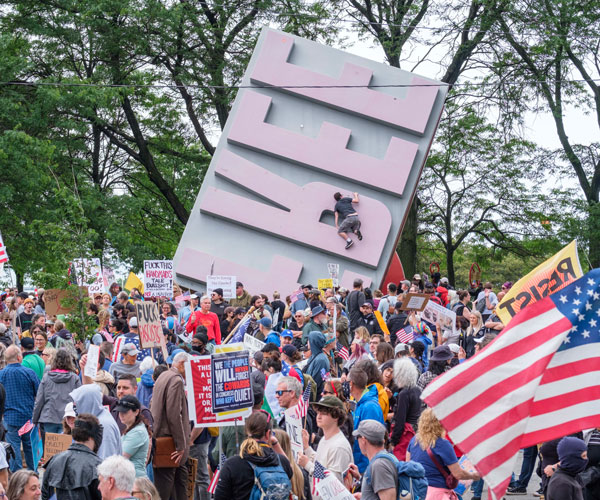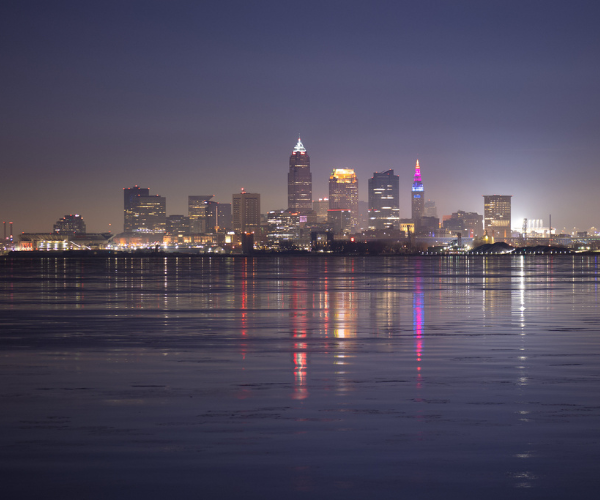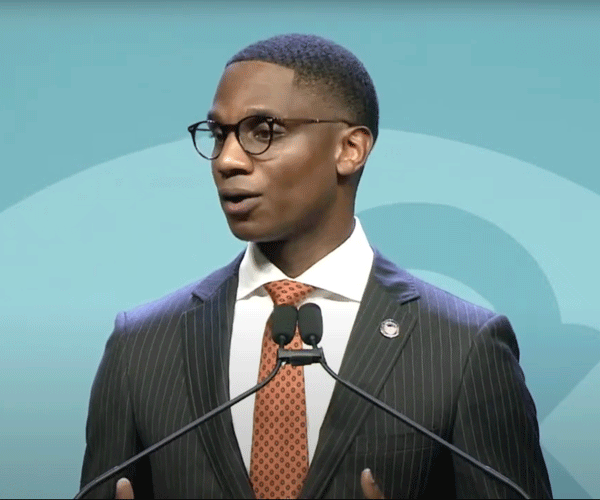Ever seen the mayor of Cleveland’s office? It’s gorgeous. Tall windows, a gilded ceiling, a mural of explorers disembarking at the Cuyahoga River’s mouth, a fireplace taller than a person. I’ve been there once, to interview Mayor Jane Campbell, and I couldn’t help staring at the palatial décor rather than the friendly woman greeting me.
I’m not saying Campbell’s presence should have filled the room. No one’s could. Its throne-room feel is a relic of the 1910s, when Cleveland was a boomtown, the sixth-largest city in the country, about to grow to 800,000 people. We wouldn’t want a mayor whose ego was as big as that room, who didn’t realize it’s way too huge and regal for the country’s 36th-largest city — and its poorest.
Should we also shrink our expectations for whoever’s in that office? Is it simplistic, even undemocratic, to look for a larger-than-life leader — as some people suggested when we asked them to imagine their perfect Cleveland mayor (see page 118)? Maybe.
But when Clevelanders say the city needs strong leaders, they mean the mayor. No one has as much power to change our priorities, start or settle debates, invite or welcome a new business to town.
Some say money unlocks the door to the mayor’s office, but sheer drive and personality lifted plenty of ex-mayors past better-funded opponents. Issues are important, but every one of this year’s candidates promise more jobs, better schools, safer streets.
Here are the real keys to the race, the tests the candidates (who you’ll meet starting on page 114) will face this month and next. Too bad those gambling tents in the Flats don’t let you wager on this fall’s highest-stakes sport. But if you want to bet on who’ll be mayor next year, here’s what to watch.
1 Labor Day Parade
U.S. Rep. Stephanie Tubbs Jones’ Labor Day parade kicks off Cleveland’s election season and is full of early clues about the campaigns. As the procession heads up Kinsman Road to Luke Easter Park, savvy parade-goers count the volunteers working the crowds to test the campaigns’ grass-roots strength. They’ll watch who’s walking or riding with Campbell, Council President Frank Jackson, Judge Robert Triozzi. Some local politicians announce their endorsements on Labor Day by marching with their candidate. Sometimes you can even get a sense of a campaign’s character. “Watch whether Frank’s shaking hands and smiling,” suggests one political observer. “He needs to come out of his shell a little bit.”
2 Will Frank Jackson Wake Up?
Jackson is a shy, quiet man. “I would rather not say something than say something,” he told me this summer. “I would rather sit down and enjoy myself in a crowd than getting around and glad-handing.” He’s never run for office outside his ward. Does he have it in him to win a citywide campaign?
That is people’s biggest question about Jackson, even though he started the year as the front-runner. He was way ahead of Campbell in three private polls last winter (46 percent to 30 percent in one). But Campbell’s strong 2005, full of new development projects, has probably narrowed the gap, while Jackson hasn’t made much of an impression. He’ll lose if he comes off as the even nicer, less energetic alternative to Campbell.
When I interviewed Jackson, though, he showed passion for getting things done, lifting people out of poverty and understanding what average Clevelanders want. If he can communicate that passion to a mass audience, he’ll probably be the next mayor.
3 The Stern Teacher
How can both these truisms we keep hearing be correct? No. 1: Education is the most important issue in this election. No. 2: The school levy is doomed to fail again. The answer is, Clevelanders are no longer convinced that the schools are improving fast enough.
When the levy failed last November, city leaders praised the district’s rising test scores, blamed the state for not fixing the school-funding system and blamed the media for Barbara Byrd-Bennett’s plunging popularity. Now, after massive layoffs, Plain Dealer reports on chaos in the high schools, the levy’s huge second failure in August and Byrd-Bennett’s resignation, any mayoral candidate who sounds complacent about the issue will lose. To ride the schools crisis to victory, a candidate will have to come off like your toughest high school teacher, the one who cared about students but also was feared, who was impossible to fool, threw the obnoxious kids out of class and insisted you get a lot better, fast.
4 Draper vs. Draper
If Jackson sleepwalks through the race or disappointed voters desert Campbell, ex-Safety Director Jim Draper has the best chance to edge out one of them in the Oct. 4 primary. No other challenger has as much money (thanks to his support from CEOs such as Invacare’s Mal Mixon) or as much potential support on both sides of town: Draper is a black ex-cop who resigned after the mayor’s 2003 police and fire layoffs.
How will Draper, 64, a retired career administrator, do as a campaigner? Our reporter who interviewed him found him totally uncharismatic, yet a local political observer describes him as “much more personable” than Jackson. Are there two Drapers? “When he’s on, when he’s well-rested and everything, particularly in front of his peers — African-Americans — he’s charismatic and gospel-like,” says a City Hall insider. “But I’ve also seen him very combative,” arguing openly with the mayor during meetings. Which Draper voters see may be key.
5 Who’s With Whom?
Four years ago, Stephanie Tubbs Jones’ support elevated Raymond Pierce into the mayoral runoff, while the AFL-CIO’s volunteer army made Campbell unstoppable. This year, Tubbs Jones could rearrange another race with a surprise — reconciling with Campbell, say, or backing Draper — but she’s more likely to support Jackson, solidifying the black East Side vote behind him. Prominent black ministers, who make the other influential East Side endorsements, may be more scattered this year, among Jackson, Campbell and Draper (a deacon in his church).
The AFL-CIO may abandon Campbell for Jackson because she invited a nonunion Wal-Mart store to town (see key No. 7). Even if it grudgingly endorses her, its volunteers will likely stay home, depriving her of grassroots strength.
The Plain Dealer will be influential, too — not just its endorsement, but also the tone of its reporting (and its reporters and editorialists usually think alike). Its editorials have often criticized the mayor, but this year they’re savaging City Council for obstructing her agenda. Expect the paper to criticize Jackson’s style and priorities, maybe endorse a second-tier candidate in the primary, such as Triozzi or ex-Councilman Bill Patmon, then give the mayor a backhanded endorsement in October.
(Note who isn’t a key this year: the business community. For the first time in memory, there’s no “business candidate.”)
6 The City Club Debate
This most-watched debate, on Sept. 27, a week before the primary, is the last chance for candidates to grab attention. Triozzi, who’s running as a “new ideas” candidate, and Patmon and former Euclid Mayor David Lynch, running as “leadership experience” candidates, will try hard to stand out at a crowded debate table. Expect Jackson to tread water here; public speaking isn’t his strength. Though all the challengers will be taking shots at her, expect Campbell to do well. She’s good at this kind of thing.
7 The Wal-Mart Factor
Doesn’t everyone want the mayor to bring jobs to town? Not if some of them are at a Wal-Mart, since the megachain has a reputation for low wages as well as low prices. Campbell’s support of the Steelyard Commons shopping center may cost her support from two voting blocs. Unions are mad because Steelyard Commons’ Wal-Mart will be a Supercenter that carries groceries, competing with unionized grocery stores. Less numerous but even louder is the Ohio City/Tremont professional crowd, which tends to see Wal-Mart as a threat to its beloved Dave’s Supermarkets and knows how to work the media; every political blog in town seems obsessed with attacking the mayor over Wal-Mart.
Both groups were willing to see Steelyard Commons die if that was what it will take to run Wal-Mart out of town. Will the rest of Cleveland really punish the mayor for bringing about 40 new businesses and 1,800 jobs into the city? Councilman Zack Reed says the issue will help her in wards like his, where voters are poor, often unemployed and already shop at suburban Wal-Marts. “[They say], ‘Councilman, I want to get that job,’ or, ‘I don’t want to have to go way out of my neighborhood to go shopping,’ ” Reed says. If the AFL-CIO deserts Campbell, she might make Steelyard Commons an issue herself, saying she fought for jobs while Jackson’s council almost drove them away.
8 The Mayor Is The Mayor
Count on Campbell to use all the powers of her office to capture attention in September and especially October. “Watch the announcements and promises that Ms. Campbell is making — things she can and can’t deliver on,” says one cynical observer. Since her first term got off to a slow start, she’ll be vulnerable to a counterattack — Why is this coming up now when she’s been mayor for four years?
But the more mayoral Campbell looks, the more it’ll remind people it’s easier to criticize than to run City Hall and attract jobs. Ribbon-cuttings and community appearances will remind voters they like the mayor personally. “I don’t think anybody does on-the-street campaigning better than Jane Campbell,” a supporter says.
9 The Teams
A campaign doesn’t just reflect its candidate’s personality, but also the styles of key staff and supporters. Arnold Pinkney, Jackson’s campaign manager, is an expert at getting East Side voters to the polls. That alone could get Jackson through the primary. But Pinkney’s machine isn’t nearly as strong across town, so Jackson will need the help of West Side councilpeople.
He’s likely to get it. “Most of the councilmen don’t like the mayor and are actively working against her,” says state Rep. Jim Trakas. Jackson’s campaign may seem quiet, but it’s busy organizing, Trakas says. “It’s kind of like the old thriller movies: If I were Mayor Campbell, I’d be saying, ‘It’s too quiet right now.’ ”
Campbell’s top political adviser, Gerald Austin, is “an expert in polling and understanding how to turn issues against an opponent,” Trakas says. Austin will direct carefully crafted mail and phone calls to targeted voters. He also has a reputation as a negative campaigner, so some observers fear he’ll attack Jackson personally. But getting too personal could cause a backlash. More likely are tough TV or radio ads that question Jackson’s record and political judgment.
10 The Unknowns or The Candidates Under Pressure
This mayoral race will be very close, some observers say, so the final key could be something no one expects. “We don’t know yet what the October Surprise is going to be,” says former Congressman Dennis Eckart. “It comes up in virtually any election. That’s how campaigns get tested.” The surprise could be a scandal, a budget crisis, a police shooting, a plant closing, a shocking crime. It could suddenly make jobs or safety or something else the biggest issue. Even a single flubbed line or embarrassing debate moment could reveal a flaw in a candidate’s instincts.
The question, Eckart says, is how the candidates handle the surprise. “Which campaign has the capacity to move with confidence and speed?” That shows they can perform under pressure, the final test of a strong leader.



